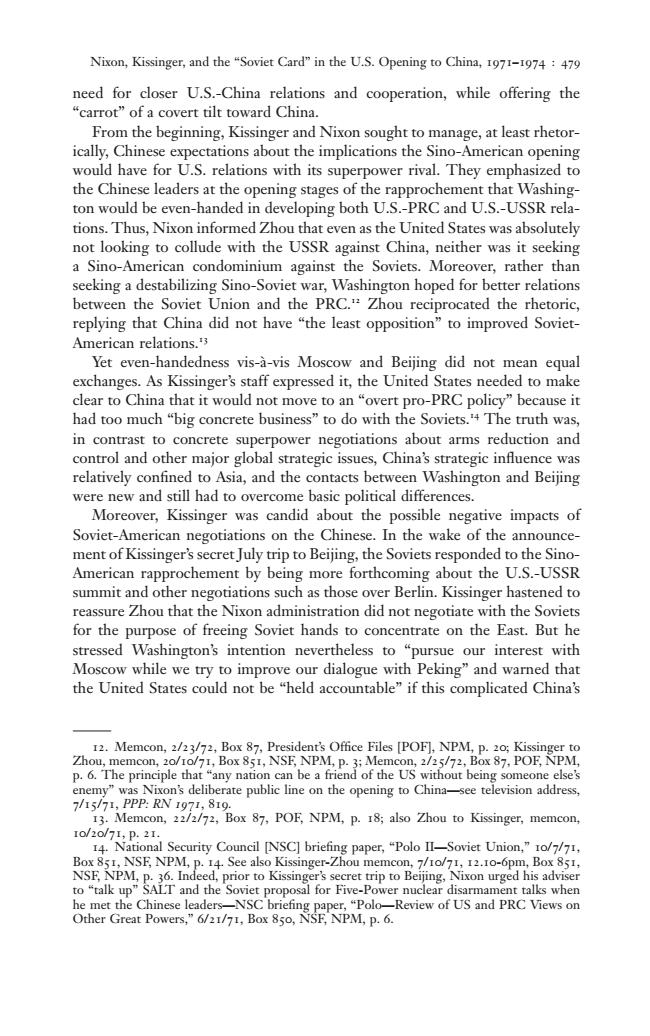正在加载图片...

Nixon,Kissinger,and the "Soviet Card"in the U.S.Opening to China,1971-1974:479 need for closer U.S.-China relations and cooperation,while offering the “carrot'”of a covert tilt toward China. From the beginning,Kissinger and Nixon sought to manage,at least rhetor- ically,Chinese expectations about the implications the Sino-American opening would have for U.S.relations with its superpower rival.They emphasized to the Chinese leaders at the opening stages of the rapprochement that Washing- ton would be even-handed in developing both U.S.-PRC and U.S.-USSR rela- tions.Thus,Nixon informed Zhou that even as the United States was absolutely not looking to collude with the USSR against China,neither was it seeking a Sino-American condominium against the Soviets.Moreover,rather than seeking a destabilizing Sino-Soviet war,Washington hoped for better relations between the Soviet Union and the PRC.Zhou reciprocated the rhetoric, replying that China did not have "the least opposition"to improved Soviet- American relations.'3 Yet even-handedness vis-a-vis Moscow and Beijing did not mean equal exchanges.As Kissinger's staff expressed it,the United States needed to make clear to China that it would not move to an "overt pro-PRC policy"because it had too much "big concrete business"to do with the Soviets.'+The truth was, in contrast to concrete superpower negotiations about arms reduction and control and other major global strategic issues,China's strategic influence was relatively confined to Asia,and the contacts between Washington and Beijing were new and still had to overcome basic political differences. Moreover,Kissinger was candid about the possible negative impacts of Soviet-American negotiations on the Chinese.In the wake of the announce- ment of Kissinger's secret July trip to Beijing,the Soviets responded to the Sino- American rapprochement by being more forthcoming about the U.S.-USSR summit and other negotiations such as those over Berlin.Kissinger hastened to reassure Zhou that the Nixon administration did not negotiate with the Soviets for the purpose of freeing Soviet hands to concentrate on the East.But he stressed Washington's intention nevertheless to "pursue our interest with Moscow while we try to improve our dialogue with Peking"and warned that the United States could not be "held accountable"if this complicated China's 12.Memcon,2/23/72,Box 87,President's Office Files [POF],NPM,p.20;Kissinger to Zhou,memcon,20/1o/71,Box 851,NSF,NPM,p.3;Memcon,2/25/72,Box 87,POF,NPM, p.6.The principle that"any nation can be a friend of the US without being someone else's enemy"was Nixon's deliberate public line on the opening to China-see television address, 715/71,PPP:RN1971,819. 13.Memcon,22/2/72,Box 87,POF,NPM,p.18;also Zhou to Kissinger,memcon, Io/2o/71,p.2I. 14.National Security Council [NSC]briefing paper,"Polo II-Soviet Union,"o/7/71, Box 851,NSF,NPM,p.14.See also Kissinger-Zhou memcon,7/1o/71,12.10-6pm,Box 851, NSF,NPM,p.36.Indeed,prior to Kissinger's secret trip to Beijing,Nixon urged his adviser to "talk up"SALT and the Soviet proposal for Five-Power nuclear disarmament talks when he met the Chinese leaders-NSC briefing paper,"Polo-Review of US and PRC Views on Other Great Powers,"6/21/71,Box 850,NSF,NPM,p.6.need for closer U.S.-China relations and cooperation, while offering the “carrot” of a covert tilt toward China. From the beginning, Kissinger and Nixon sought to manage, at least rhetorically, Chinese expectations about the implications the Sino-American opening would have for U.S. relations with its superpower rival. They emphasized to the Chinese leaders at the opening stages of the rapprochement that Washington would be even-handed in developing both U.S.-PRC and U.S.-USSR relations. Thus, Nixon informed Zhou that even as the United States was absolutely not looking to collude with the USSR against China, neither was it seeking a Sino-American condominium against the Soviets. Moreover, rather than seeking a destabilizing Sino-Soviet war, Washington hoped for better relations between the Soviet Union and the PRC.12 Zhou reciprocated the rhetoric, replying that China did not have “the least opposition” to improved SovietAmerican relations.13 Yet even-handedness vis-à-vis Moscow and Beijing did not mean equal exchanges. As Kissinger’s staff expressed it, the United States needed to make clear to China that it would not move to an “overt pro-PRC policy” because it had too much “big concrete business” to do with the Soviets.14 The truth was, in contrast to concrete superpower negotiations about arms reduction and control and other major global strategic issues, China’s strategic influence was relatively confined to Asia, and the contacts between Washington and Beijing were new and still had to overcome basic political differences. Moreover, Kissinger was candid about the possible negative impacts of Soviet-American negotiations on the Chinese. In the wake of the announcement of Kissinger’s secret July trip to Beijing, the Soviets responded to the SinoAmerican rapprochement by being more forthcoming about the U.S.-USSR summit and other negotiations such as those over Berlin. Kissinger hastened to reassure Zhou that the Nixon administration did not negotiate with the Soviets for the purpose of freeing Soviet hands to concentrate on the East. But he stressed Washington’s intention nevertheless to “pursue our interest with Moscow while we try to improve our dialogue with Peking” and warned that the United States could not be “held accountable” if this complicated China’s Nixon, Kissinger, and the “Soviet Card” in the U.S. Opening to China, 1971–1974 : 479 12. Memcon, 2/23/72, Box 87, President’s Office Files [POF], NPM, p. 20; Kissinger to Zhou, memcon, 20/10/71, Box 851, NSF, NPM, p. 3; Memcon, 2/25/72, Box 87, POF, NPM, p. 6. The principle that “any nation can be a friend of the US without being someone else’s enemy” was Nixon’s deliberate public line on the opening to China—see television address, 7/15/71, PPP: RN 1971, 819. 13. Memcon, 22/2/72, Box 87, POF, NPM, p. 18; also Zhou to Kissinger, memcon, 10/20/71, p. 21. 14. National Security Council [NSC] briefing paper, “Polo II—Soviet Union,” 10/7/71, Box 851, NSF, NPM, p. 14. See also Kissinger-Zhou memcon, 7/10/71, 12.10-6pm, Box 851, NSF, NPM, p. 36. Indeed, prior to Kissinger’s secret trip to Beijing, Nixon urged his adviser to “talk up” SALT and the Soviet proposal for Five-Power nuclear disarmament talks when he met the Chinese leaders—NSC briefing paper, “Polo—Review of US and PRC Views on Other Great Powers,” 6/21/71, Box 850, NSF, NPM, p. 6